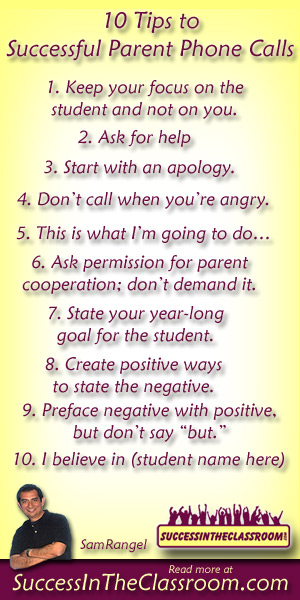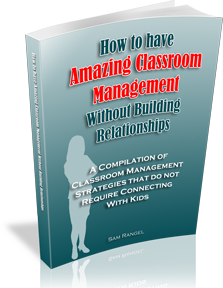One of the most important, yet most neglected responsibilities of many teachers is communicating with parents.
The problem is that many teachers are great talking to kids, but when it comes to talking to adults about their precious kids, it can get a bit tough.
Many teachers leave this task at the bottom of the to-do list.
I know I did.
Unfortunately, many times the conversation starts with, “Johnny was bad today.”
What the parent hears often times, however, is “My precious baby was accused of allegedly being bad.”
Wouldn’t it be great if teachers only had to communicate good news?
Nobody likes to have negative conversations, and that’s why many teachers don’t communicate enough with parents.
Most veteran teachers will tell you, however, that connecting with the parents of that disruptive or unmotivated student as soon as possible, will save you many problems down the road, as well as helping that student before it’s too late.
What I’ve found is that many new teachers understand this need for communication, but they just don’t know how to communicate effectively.
As many of you know, after 23 years of being in the classroom, I’m now part of administration, which has forced me to become an expert in communicating with parents, especially having to communicate bad news, like “your son is being suspended.”
I thought I’d share some of the lessons I’ve learned – many times the hard way.
Here are 10 Tips to Successful Parent Phone Calls
1. Keep your focus on the student and not on you.
Comments like, “Johnny kept me from me teaching the class,” are making you the focal point. Even though it’s true, parents will listen better if you say something like, “Johnny missed out on the lesson today, because he was talking too much.”
2. Ask for help
“Mrs. Johnson, I need your help. Johnny is not wanting to do his work in class, and I was wondering if you had any ideas of what motivates him.” Not only does this serve to demonstrate that you are looking to help the student, but you can probably get some good ideas as to how to get that student more engaged that you can incorporate in your lessons.
3. Start with an apology.
“Hello Mrs. Smith. I’m sorry I have to call you for this reason, but….”
4. Don’t call when you’re angry.
Sometimes we say things we regret when we’re angry. It’s better to take a breath and wait a couple of hours before making that call.
5. This is what I’m going to do…
“I’m going make an extra effort to verify that Johnny is writing his homework down in his notebook.” Promising the parent that you are going to do a little extra to help their child goes a long way.
6. Ask permission for parent cooperation; don’t demand it.
“Can I ask that you check his notebook for what he has for homework each day?” This goes well after you’ve done number 5 above. If you say, “I need you to check his binder on a daily basis,” it will put the parent on the defensive. You’re not their boss. You can’t demand compliance on their part, even if it’s for the good of the student.
7. State your year-long goal for the student.
“I’m planning on a great year for Johnny. That’s why I’m contacting you now, before he gets too far behind.”
8. Create positive ways to state the negative.
“Johnny’s poor behavior has a negative effect on the entire class” becomes “Johnny is a leader. The kids look up to him. It would be better if he would use is influence in a more positive way.”
9. Preface negative with positive, but don’t say “but.”
“I like Johnny. He’s a good kid. I just wish he was making better choices.” When you add, “but” you erase the positive. Tom Henshel from EssentialComm.com calls it a Kiss – Slap. Adding a “but” between the good and the bad part of your sentence leaves the parent only remembering the slap.
10. I believe in (student name here)
No parent wants to hear that the teacher has given up on their child. The best way to keep the parent on your side is to remind him/her that you believe in the student. “I believe Johnny can have a great year. He is more than capable. If he can continue to make positive choices and focus on his education, I know that he will do great this year.”
Successful teachers communicate with the parents of their students. No parent wants to hear anything bad about their child, but these conversations must take place for the benefit for both the teacher and the student.
Yes, there are parents who just don’t care, but they are a minority. In my experience, most parents care, and want the best for their kids. We need to make sure that through our conversation with them that they understand that we also want the best for their kids.
Since we’re on the topic of communicating with parents, I wanted to share a new website that I created that helps teachers make that initial contact. It’s called K12Forms.com. It helps teachers create a basic letter of concern that they can copy and paste into an email or into a document to send home. I’ve also noticed that many teachers find it difficult to communicate with parents who only speak Spanish, so I’ve added a feature that converts the concerns into a Spanish letter that you can send home with the student. Give it a try, and let me know what you think. You can find it at: http://www.K12Forms.com.
Until next time,
Here’s to your Success in the Classroom,
Thanks,
Sam




Sam,
I am a newly hired 1st grade teacher and I am so happy I stumbled across your tips for new teachers! Your website is very inspiring! I am writing to you because one of your tips was to create a class website/blog etc. and I would love to but I could really use some suggestions and/or directions. I tried to find the information that you said was listed on your website on how to do it, but I couldn’t find it. I would really appreciate it if you could e-mail the link or give any feedback! Thank you in advance and thank you for helping me prepare for my first classroom!
Hello Katie,
Thank you for your comment. I’ve created a tutorial on setting up a blog. You can find it here: http://successintheclassroom.com/every-teacher-should-have-at-least-two-websites/
Please let me know when you create your website. I’ll add it to my list of cool links.
Good luck!
Sam